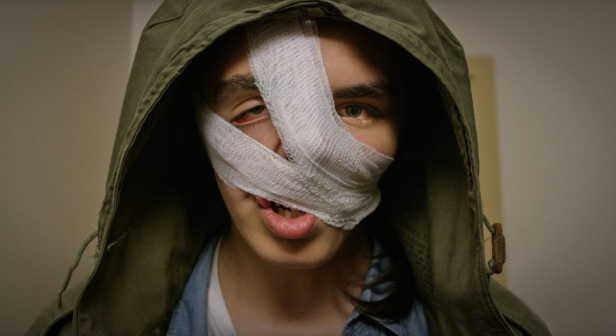“I’m disgusting,” declares Augustin (Robin L’Houmeau) near the beginning of Alexandre Franchi’s Happy Face.
This quiet nineteen-year-old man in a hoody, his face wrapped in bandages and obviously distorted, is attending a support group for people with facial disfigurements, where a sense of insidiously internalised inferiority is not uncommon. In her opening speech, the group’s convenor Vanessa (Debbie Lynch-White) has introduced herself as a “second-class citizen” because of the way that the outside world judges her. Others in the group – some diseased, others injured, some willingly there, some less so – come with differing degrees of confidence, and over the course of the film, that confidence will be sorely tested by exposure to the realities of ugly prejudice beyond the group’s zone of comfort. Yet there is something particularly arresting about the raw simplicity in Augustin’s expression of self-loathing, as though he fully believes it, and does not just regard it as a misplaced perception of himself by others. “I want to be a good person,” he says, underlining the fact that he is using ‘disgusting’ as a moral as well as aesthetic term.
Augustin is also a fraud: his real name is Stan, he is faking his deformity and, like the protagonist of David Fincher’s Fight Club (1999), he has deceived his way into the support group for his own personal reasons. All this might be taken to confirm how disgusting a character he truly is – except here, as in Lars Von Trier’s The Idiots (1998), even a faker has real, deep-seated problems. In this case, Stan is struggling to work through his emotional trauma over his mother Augustine (Noémie Kocher) – note that his pseudonym is a masculine variant on her name – and the disfigurement and impending death brought on by her metastasising cancer. Even after he has been unmasked, Stan finds accommodation in the group, his empathy and aggression proving helpful to some of the members, who accept him – an outsider – into the group in much the same way that they as outsiders would like to be accepted into society at large.
Co-writing with Mark A. Krupa, director Franchi (The Wild Hunt, 2009) has crafted an unusual and tender film about identity and otherness, alienation and belonging, set in late-Eighties Montreal. In negotiating his difficult relationship with his dying mother, Stan draws inspiration from Cervantes’ Don Quixote, whose protagonist assumes a nobility that is both fantasy and real, and from the Dungeons and Dragons games in which, with friends, Stan acts out heroics and deeds of transformative miracle. He also brings into the group quotes from the former and figurines from the latter, as spurs to improve their lives and to help them find the courage to confront a hostile world. Stan is tentatively doing with his new friends what he should be doing with Augustine, in a series of rehearsals (and reversals – remember that he is initially playing her rather than himself) which both show up his good side, and defer an approaching reality that increasingly he can no longer ignore or deny.
Coming just before the internet would radicalise our reinventive control over image, selfhood and community, Stan’s games of alterity and rôle-play extend to the other members of the group – especially Otis (David Roche), Maggie (Alison Midstokke), Buck (Cyndy Nicholson) and Jocko (E.R. Ruiz) – all of whom have their own problems with family and friends that they need support and courage to confront. In a sense, each one of these misfits is learning to reimagine and reconfigure their own difference in order to find their place in a superficial world – and in order to become a good person in the eyes of their nearest and dearest. It is a funny, difficult and in the end deeply affecting story to which anyone who has ever felt estranged, outcast or unloved – which is to say almost everybody – will easily be able to relate.
Happy Face was seen and reviewed at Arrow Video FrightFest 2019.
